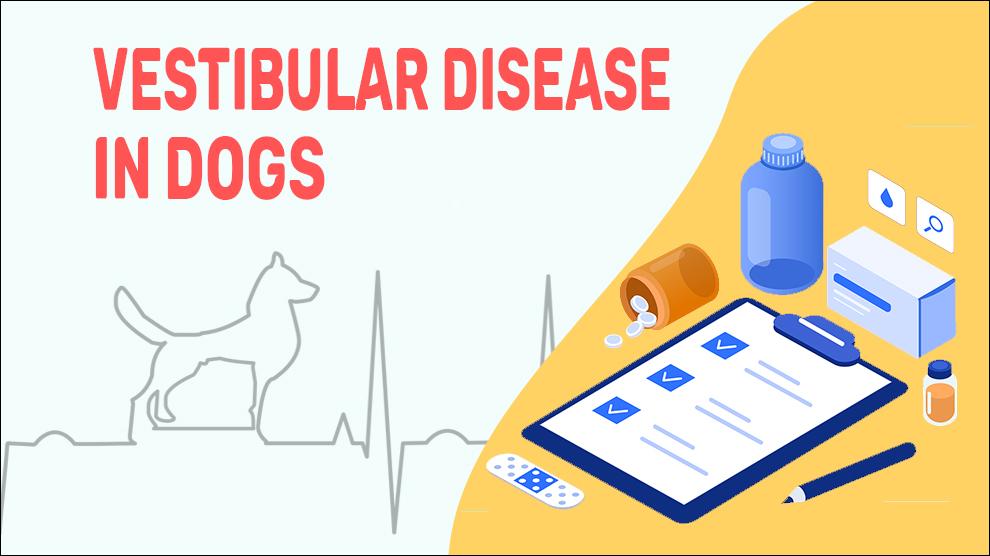What Is Vestibular Disease In Dogs?
Canine vestibular disease refers to idiopathic, non-progressive disorientation and disturbance of balance. Similar to humans, the dog’s vestibular system is a sensory system that is accountable for maintaining postural equilibrium and coordinating the movement of the eyes and position of the head. This is more prevalent among older dogs. This is also called canine idiopathic vestibular syndrome and geriatric or old dog vestibular syndrome.
The peripheral components of the vestibular system are situated inside a section of the ear, just by the side of the eardrum (the middle ear). The inside part of the middle ear has a smaller region of many interconnected structures including thousands of extracellular tiny calcium-carbonate minerals(otoconia), jointly called the inner ear. Vestibular disease is whichever unusual function of the vestibular system (inner or middle ear) causes unexpected loss of coordination and balance, including other symptoms. Any condition or trauma that affects the middle ear—or particularly affects the inner ear—may result in vestibular disease.
With vestibular ataxia, it is also typical to see unusual eye movement, normally wandering from side to side. In an attempt to stay upright, dogs will often stand with their feet spaced out and they may usually tilt their head towards the side of the lesion in vestibular syndrome.
Sometimes with vestibular ataxia, the dog cannot stand and may roll on the side of the lesion or roll completely over. When the ataxia is caused by cerebellum dysfunction (lesion in the cerebellum), the dog will walk with an overreaching (overstepping) “goose-stepping” gait, called hypermetria.
Symptoms Of Vestibular Disease In Dogs
- Head tilting
- Loss of balance
- Disorientation
- Difficulty maintaining balance/ Broad stance
- Stumbling or staggering (ataxia)
- When making sudden turns, there will be a loss of balance
- Irregular jerking eye movements (Nystagmus) which are typically up and down, but can also be circular or sideways
- Tremors
- Hypothyroidism
- Nausea and vomiting
- Dilation of pupils
- Titubation (swaying or shaking of the trunk or head while sitting or standing)
Treatment Options For Vestibular Disease In Dogs
- Antihistamines - Chlorpheniramine, Cyproheptadine, Cetirizine, Clemastine, Trimeprazine and Hydroxyzine
- Anti-nausea medication: Maropitant citrate (Cerenia)
- NSAIDs:
- Carprofen (Carprieve, Canidryl, Rimadyl, Aventicarp, Zinecarp, Carpox, Rimifin, Vetprofen)
- Firocoxib (Equioxx, Previcox)
- Meloxicam (Metacam, Muvera, Mobic)
- Etodolac (Lodine, EtoGesic)
- Deracoxib (Novartis, Deramaxx)
- Antibiotics such as chloramphenicol, gentamicin, amoxicillin, ciprofloxacin, tobramycin, oxytetracycline, etc
Home Remedies For Vestibular Disease In Dogs
- Help your dog have healthy ears with supplements
- Use a fresh-smelling ear cleansing solution or ear drops
- Cooled chamomile tea can be applied with a washcloth to clean the affected ears
- Use warm compresses for 10 to 20 minutes; apply them 2 to 3 times daily
How To Prevent Vestibular Disease In Dogs?
- The best way of vestibular disease prevention is to address the ear infection and inflammation at its initial stages
- When your dog is having a vestibular attack
- Dogs can get quite worried, so keep them comfortable
- Detain your pet in a small room
- Take away nearby objects that can trip him over
- Don’t allow him near to stairs
- When going outdoors, Use a harness to help him
- Provide supportive bedding
- Make sure he has food and water around the corner
Affected Dog Breeds Of Vestibular Disease
American Bulldog, Beagle, Bichon Frise, Boston Terrier, Shar Pei, Cavalier King Charles Spaniel, Chihuahua, English Springer Spaniel, German Shepherd, Golden Retriever, Jack Russell Terrier, Labrador Retriever, Lhasa Apso, Old EnglishSheep Dog, Scottish Terrier, Saint Bernard, Shih Tzu, Wirehaired Fox Terrier, Doberman Pinscher, Young Dogs, Senior Dogs
Causes And Prognosis For Vestibular Disease In Dogs
1. Causes:
- Ear infection
- Brain degeneration
- Certain medications
- Immunosuppression/ autoimmune disorders
- Foreign objects inside the ear canal
- Labyrinthitis, vestibular neuronitis, and other inner ear inflammatory conditions
- Tumors or polyps
- Meningoencephalitis
- Hypothyroidism
2. Mortality:
There is no documented mortality due to this condition.
3. Diagnosis:
- Complete blood count, chemistry panel
- Ear cytology
- Otoscope
- Radiographs
4. Prognosis:
Prognosis depends on appropriate diagnosis and treatment for cases of Vestibular disease. Once the initial cause is appropriately addressed, the pet should recover within 3 days and complete recovery should happen within 2 weeks. Although, recurrence will be a problem following medical treatment in affected dogs.
When To See A Vet For Vestibular Disease In Dogs?
Contact your vet right away, if you notice any of the following:
- Head tilting
- Loss of balance
- Disorientation
- Difficulty maintaining balance/ Broad stance
- Stumbling or staggering (ataxia)
Food Suggestions For Vestibular Disease In Dogs
- Consider a diet with Whole, organic foods and also provide sufficient antioxidants
- Lean meats: Lean beef (top loin, Tenderloin, ground round, and sirloin tip); 90% (or leaner) meat (beef, turkey, chicken)
- Low fat, high protein foods - pork loin, turkey, flesh fish, salmon, canned tuna, shrimp, split Peas, Lentils, and Beans
- Omega3 fatty acids - Salmon, tuna, Mackerel, sardines, Herring, chia seeds, flaxseed, etc
- Green Leafy vegetables: Beet greens, cabbage, Spinach, Broccoli, Green Beans, cauliflower, etc
Conclusion
The prognosis for recovery from vestibular disease is different for every dog. Based on the treatment plan or medication schedule prescribed by your vet, owners can get an idea of when to look forward to completing recovery. Treatment may need to be evaluated often to stop recurrence. The prognosis is excellent when it is diagnosed early.

















